- 2025 Year in Review: 80th Anniversary Highlights at Zhejiang University Guanghua Law School2025-12-31
- The Second China–Latin America and Caribbean Region Legal Professionals Exchange Program (Hangzhou Session) was successfully held at Zhejiang University.2025-12-18
- “If the World is a Family” — Student Exchange and Legal Practice Seminar between Newcastle Law School and Guanghua Law School2025-12-08
On the morning of October 24, 2025, the 10th session of the 2025 International Law and Foreign-related Rule of Law Salon & Cutting-edge Legal Lecture Series, titled “Due diligence and marine environmental protection: exploring an ubiquitous concept,” was successfully held in Room 206, Building 5, Zhijiang Campus, Zhejiang University.
The lecture featured Professor James Harrison, Chair Professor at the University of Edinburgh School of Law, as the keynote speaker. Professor Shi Yubing, Vice Dean of Guanghua Law School, Zhejiang University, served as the moderator. The discussants included Associate Professors Bi Ying and Qiu Wenxian of Guanghua Law School; Associate Professor Wu Wei from the China Institute of Boundary and Ocean Studies at Wuhan University; as well as Dr. Wang Sen and Dr. Duan Wen, research fellows under Zhejiang University's Hundred Talents Program.
The event also attracted postgraduate students specializing in international law and the law of the sea from Zhejiang University, Wuhan University, and Shanghai Jiao Tong University.
Moderator Professor Shi Yubing introduced the keynote speaker, highlighting that Professor James Harrison currently serves as Chair Professor at the University of Edinburgh School of Law and has over fifteen years of teaching and research experience in public international law. His scholarship covers international and domestic environmental law, governance mechanisms, and dispute settlement, with a particular focus on the protection and preservation of the marine environment.
In his keynote presentation, Professor Harrison explored the increasingly prominent concept of due diligence in the fields of international maritime law and environmental law in recent years.
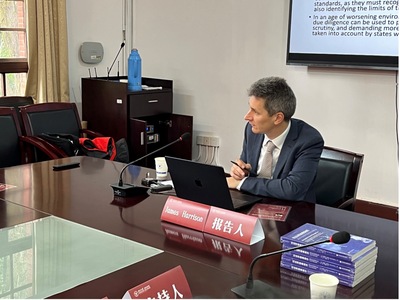
Professor James Harrison emphasized that the concept of due diligence has become central in a number of recent landmark decisions by international courts and tribunals, not only in the field of the law of the sea but throughout international law more broadly. The objective of his presentation was to reflect on the doctrinal understanding of due diligence and to analyze the challenges associated with applying this concept to marine environmental protection.
Professor Harrison began with The Pulp Mills Case, in which the International Court of Justice reconceptualized this long-standing common law doctrine in a modern international legal context. He then demonstrated how, following this case, the concept of due diligence has been widely invoked across international legal instruments and judicial decisions.
He proceeded to examine due diligence from both procedural and substantive perspectives. He noted that due diligence has traditionally been interpreted as requiring states to undertake certain procedural steps—such as environmental impact assessments, consultation, monitoring, and information exchange. However, failure to follow these procedural steps does not automatically constitute a breach of substantive obligations. Procedural obligations can facilitate substantive consensus, yet where states cannot agree on what constitutes an adequate level of protection, the state of origin must adopt appropriate substantive measures and bear the burden of justifying their adequacy.
Professor Harrison then demonstrated how due diligence is embedded in the provisions of the United Nations Convention on the Law of the Sea (UNCLOS), and conducted a deeper analysis by referencing Article 34(2) of the BBNJ Agreement, differentiating between the procedural and substantive dimensions of due diligence. He highlighted that due diligence is a highly dynamic concept, shaped by factors including scientific evidence and precaution, existing international standards, and states’ technological capacities.
He further analyzed the relationship between due diligence and rules of reference, observing a shift toward a stricter interpretation of due diligence—particularly as reflected in the recent climate change advisory opinions of ITLOS and the ICJ, both of which affirm that states bear strict due diligence obligations in this domain.
In his conclusion, Professor Harrison addressed the limitations of due diligence as a legal concept. He noted that due diligence does not provide specific guidance on what actions states must take, nor can it substitute for the necessary process of state negotiation to establish concrete standards of conduct.
During the subsequent discussion session, experts and students from participating universities posed a range of thoughtful questions, sparking a lively academic exchange.
Professor Shi Yubing expressed his appreciation to Professor Harrison and praised the depth of his insights. He pointed out the potential overuse of the concept of due diligence in recent international legal discourse and raised concerns about whether due diligence obligations should apply equally within and beyond national jurisdiction. He further noted that, in treaty negotiations he had personally participated in, intense debates arose regarding whether to use the term due diligence or due regard, and he asked Professor Harrison to clarify the distinction between the two concepts. Professor Shi also referenced scholarly views that frame the obligation to protect the marine environment as an obligation erga omnes and posed the question of whether such an obligation could similarly apply to the protection of the marine environment within areas under national jurisdiction.
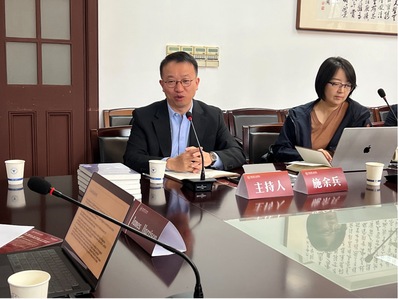
Associate Professor Bi Ying began her remarks by referring to the title of the lecture and expressed keen interest in Professor Harrison’s choice of the word “ubiquitous” to describe the concept of due diligence. She noted that ubiquitous—meaning “ever-present” or “found everywhere”—often carries a negative connotation, suggesting something that is pervasive to the point of being exhausting, intrusive, or lacking novelty, and is sometimes translated as “all-pervasive” or “overly widespread.”
Associate Professor Bi invited Professor Harrison to elaborate on his view regarding the overuse of the concept of due diligence in international law discourse. She further pointed out—by way of a thoughtful rhetorical turn—that scholars themselves bear a due diligence obligation to clarify and define the true meaning and scope of the concept.
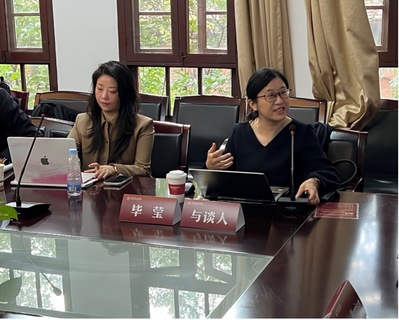
Associate Professor Qiu Wenxian expressed her appreciation for Professor Harrison’s insightful presentation and initiated a discussion on the relationship between deep-sea mining and marine environmental protection. She observed that deep-sea mining involves significant capital investment and poses substantial environmental risks to the marine ecosystem. Professor Qiu invited Professor Harrison to further elaborate on how the level of due diligence required of states corresponds to the risks associated with deep-sea mining activities, and to analyze the practical implications of due diligence when it shifts from an obligation of result to an obligation of conduct.
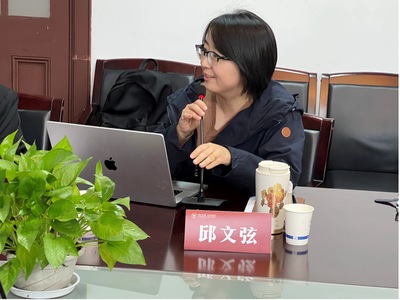
Associate Professor Wu Wei began by expressing her gratitude for the warm reception from Zhejiang University faculty and students. She then emphasized the importance of monitoring mechanisms related to the due diligence obligation, a key issue raised during Professor Harrison’s presentation.
She noted that the role of international courts and tribunals should be understood as one of carefully reviewing state decision-making processes, rather than prescribing specific measures that states must take to fulfill due diligence obligations. With the continuous improvement of compliance mechanisms in the law of the sea, she suggested that the monitoring model for due diligence may be undergoing transformation, shifting towards a greater focus on how to optimize the due diligence obligations required of states in practice.
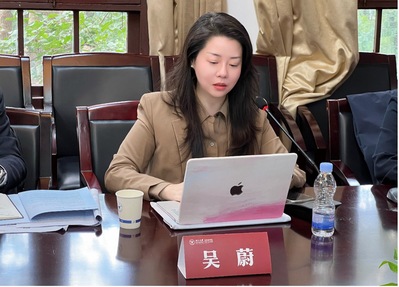
Research Fellow Wang Sen began by extending a warm welcome and expressing gratitude to Professor Harrison for his visit. He then invited Professor Harrison to share his views on the relationship between the due diligence obligation and the precautionary approach/principle, asking how the two concepts interact within the framework of international environmental and marine law.
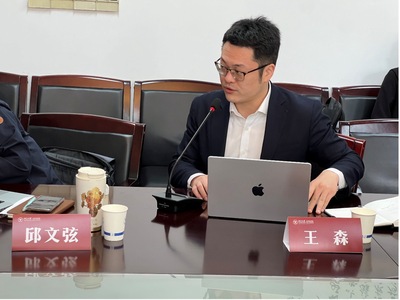
Research Fellow Duan Wen expressed gratitude to Professor Harrison for delivering such an impressive and insightful lecture. He then raised a question concerning whether rules and standards related to marine environmental protection set out in non-legally binding instruments could nonetheless be regarded as generally accepted international rules and standards, and thus serve as relevant criteria in determining whether a state has fulfilled its due diligence obligations.
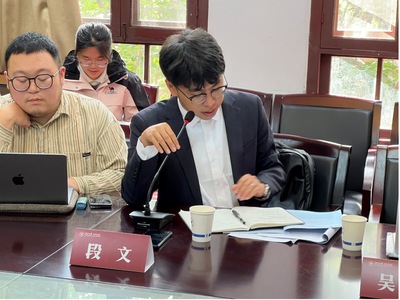
Following the discussants’ remarks, students from Zhejiang University, Wuhan University, and Shanghai Jiao Tong University actively participated in the discussion. They shared their key takeaways from the lecture and raised questions of personal academic interest. Professor Harrison responded to each comment and question in detail, engaging in thoughtful dialogue with the participants.
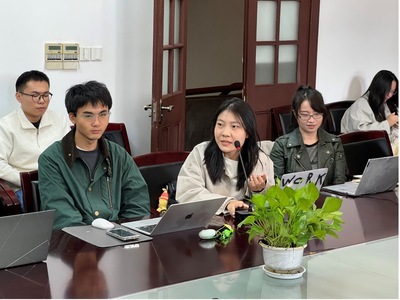
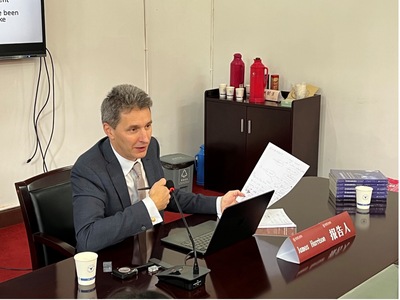
Finally, students who participated in the discussion and posed questions received copies of Professor Harrison’s monograph Saving the Oceans through Law: The International Legal Framework for the Protection of the Marine Environment, translated into Chinese by Associate Professor Wu Wei. Professor Harrison personally signed each copy for the students and took group photos with the faculty and students to commemorate the occasion.
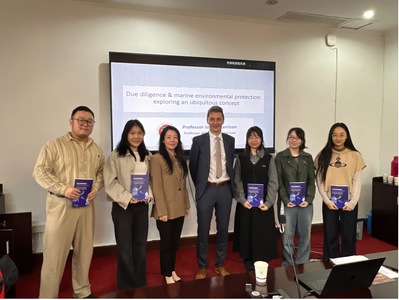
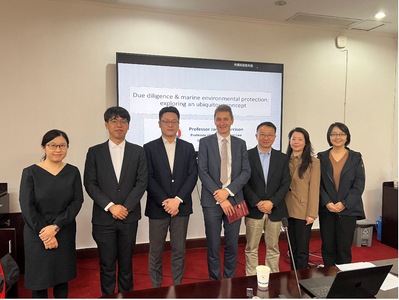
With this, the 10th session of the 2025 International Law and Foreign-related Rule of Law Salon & Cutting-edge Legal Lecture Series—“Due diligence and marine environmental protection: exploring an ubiquitous concept”—concluded successfully.
Text: Duan Wen, Cui Jiayang
Photos: Cui Jiayang

